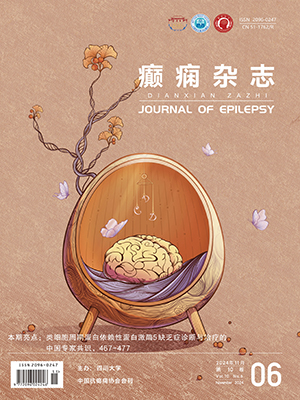| 1. |
Viale L, Allotey J, Cheong-See F, et al. Epilepsy in pregnancy and reproductive outcomes: a systematic review and meta-analysis. Lancet, 2015, 386(10006): 1845-1852.
|
| 2. |
Fisher RS, Acevedo C, Arzimanoglou A, et al. ILAE official report: a practical clinical definition of epilepsy. Epilepsia, 2014, 55(4): 475-482.
|
| 3. |
Harden CL, Meador KJ, Pennell PB, et al. Practice parameter update: Management issues for women with epilepsy-focus on pregnancy (an evidence-based review): teratogenesis and perinatal outcomes. Neurology, 2009, 73(2): 133-141.
|
| 4. |
Soontornpun A, Choovanichvong T, Tongsong T. Pregnancy outcomes among women with epilepsy: A retrospective cohort study. Epilepsy Behav, 2018, 82: 52-56.
|
| 5. |
Vajda FJE, O Brien TJ, Lander CM, et al. Does pregnancy per se make epilepsy worse? Acta Neurol Scand, 2016, 133: 380-383.
|
| 6. |
Kusznir VB, Barreto CF, Mella CC. Outcomes of pregnant women with refractory epilepsy. Seizure, 2019, 69: 251-257.
|
| 7. |
Huang CY, Dai YM, Feng LM, et al. Clinical characteristics and outcomes in pregnant women with epilepsy. Epilepsy Behav, 2020, 112: 107433.
|
| 8. |
Tomson T, Battino D, Perucca E. Teratogenicity of antiepileptic drugs. Curr Opin Neurol, 2019, 32(2): 246-252.
|
| 9. |
Jacob S, Nair AB. An updated overview on therapeutic drug monitoring of recent antiepileptic drugs. Drugs R D, 2016, 16(4): 303-316.
|
| 10. |
单浩杰, 郑东琳, 杨帆, 等. 抗癫痫药物在妊娠期癫痫患者中的应用分析. 中国医刊, 2018, 53(10): 1131-1135.
|
| 11. |
Richards N, Reith D, Stitely M, et al. Antiepileptic drug exposure in pregnancy and pregnancy outcome from national drug usage data. BMC Pregnancy Childbirth, 2018, 18(1): 84.
|
| 12. |
Hanaya R, Arita K. The new antiepileptic drugs: their neuropharmacology and clinical indications. Neurol Med Chir (Tokyo), 2016, 56(5): 205-20.
|
| 13. |
Chen ZB, Brodie MJ, Kwan P. What has been the impact of new drug treatments on epilepsy? Curr Opin Neurol, 2020, 33 (2) : 185-190.
|
| 14. |
Patsalos PN, Spencer EP, Berry DJ. Therapeutic drug monitoring of antiepileptic drugs in epilepsy: a 2018 update. Ther Drug Monit, 2018, 40(5): 526-548.
|
| 15. |
Meador KJ, Baker GA, Browning N, et al. Fetal antiepileptic drug exposure and cognitive outcomes at age 6 years (NEAD study): a prospective observational study. Lancet Neurol, 2013, 12(3): 244-252.
|
| 16. |
Razaz N, Tomson T, Wikström AK, et al. Association between pregnancy and perinatal outcomes among women with epilepsy. JAMA Neurol, 2017, 74(8): 983-991.
|
| 17. |
Menzler K, Fuest S, Immisch I, et al. Epilepsy and Pregnancy. Nervenarzt, 2016, 87(9): 937-942.
|
| 18. |
Birnbaum AK, Meador KJ, Karanam A, et al. Antiepileptic drug exposure in infants of breastfeeding mothers with epilepsy. JAMA Neurol, 2020, 77(4): 441-450.
|
| 19. |
陈兆耀, 姜亚军. 癫痫和抗癫痫药物使用对胎儿的影响. 中华神经医学杂志, 2014, 13(2): 214-216.
|
| 20. |
Veiby G, Bjørk M, Engelsen BA, et al. Epilepsy and recommendations for breastfeeding. Seizure, 2015, 28: 57-65.
|




